PRINCETON, NJ -- The Democratic primary season is ending with Barack Obama maintaining an overall advantage in national Democratic nomination preferences, but with continuing evidence of a significant gender gap. Hillary Clinton is the clear favorite of Democratic women, among whom she leads Obama by a 49% to 45% margin, while Obama leads over Clinton among Democratic men by a 20-point margin, 57% to 37%.
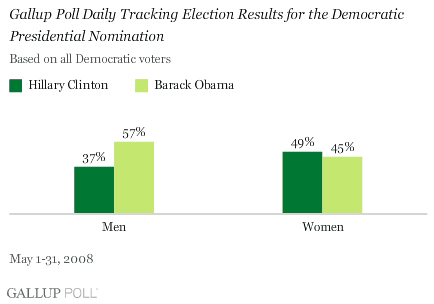
The Gallup analysis of more than 12,000 Gallup Poll Daily tracking interviews conducted among Democratic voters in May finds that Clinton's relative advantage among women is evident not only among all Democrats, but also among certain key subgroups of the Democratic electorate.
As has been well demonstrated this year, there are enormous differences among racial and ethnic groups of Democrats in candidate preferences between Obama and Clinton, but the current analysis shows that Clinton's disproportionate appeal among women (and Obama's among men) persists even when race and ethnicity are controlled for.
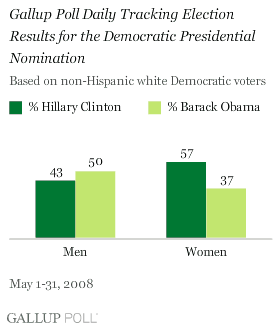
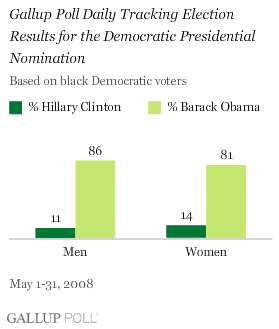
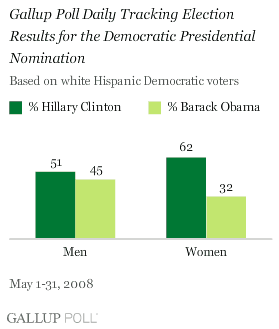
Obama has an overall lead of 70 points over Clinton among non-Hispanic black Democratic voters. He wins by a 75-point margin among black men, compared to a slightly slimmer 67-point margin among black women.
Among non-Hispanic whites, the gender gap is more pronounced. Obama wins among white men by seven points but loses among white women by a 20-point margin. Among white Hispanics, the gap is similarly large. Obama loses to Clinton among Hispanic men by six points and loses among Hispanic women by 30 points.
The other demographic dimensions that have clearly differentiated patterns of support among Democrats this year are age and education. Overall, Obama has great strength among younger Democrats and among Democrats with higher levels of education, while Clinton's strength of support is among older, less well-educated voters.
Even though Obama wins among 18- to 29-year-old Democratic voters of all genders, there is a significant gender gap. He beats Clinton among 18- to 29-year-old white men by a very large 43 points; he wins among white women aged 18 to 29 by a much smaller 12-point margin.
And, among the oldest group of white Democrats, those 65 and older (arguably Clinton's core constituency), Obama loses to Clinton among white males by 19 points but by a more substantial 36 points among white females of this age group.
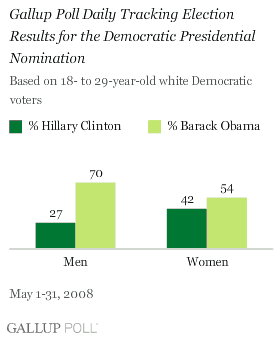
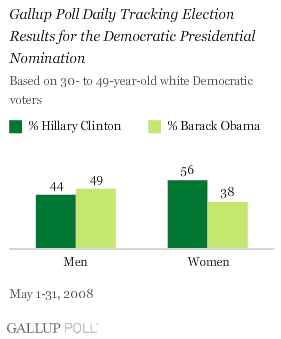
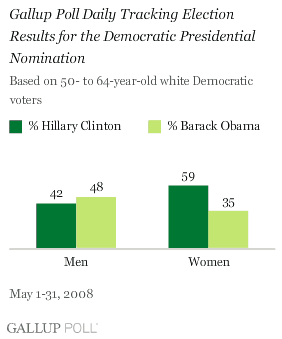
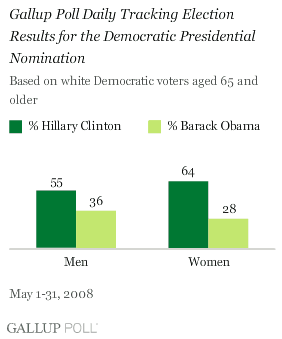
Clinton has demonstrated strength among Democratic voters who are not college graduates, while Obama does well among those who have graduated from college. But there is a gender gap "swing" of 22 points among non-college-educated white Democrats, with Obama losing to Clinton by only eight points among men in this group, and losing by 30 points among women in this group.
Among college graduates, Obama wins among men by 34 points, while Clinton edges him by one point among women, for a gender "swing" of 35 points.
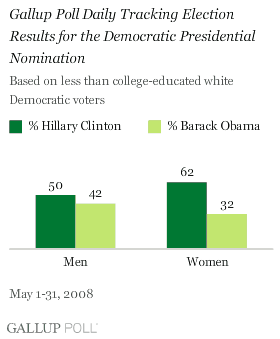
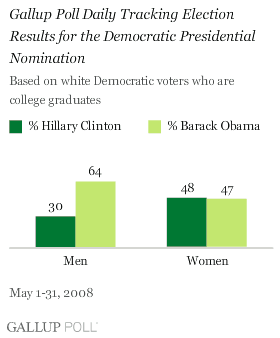
Implications
Democrats traditionally do better among women than among men in general-election presidential matchups. Assuming that Obama gains the Democratic nomination, as appears all but certain, he will need to depend on a strong turnout among women to assure his victory or, conversely, he will need to disrupt the typical pattern by which men skew toward voting for the Republican presidential candidate.
The data reviewed here among Democratic voters show clearly the degree to which Clinton, the first major-party female presidential candidate to make it this far in the process, has capitalized on the strength of Democratic women as a core constituency. This suggests that Obama thus has the general-election challenge of gaining strength among the women who have favored Clinton, or capitalizing on the opportunity provided by the men who have supported his candidacy. Some observers have suggested that Obama could face a backlash of sorts among Democratic women and thus run the risk of losing their votes in the general election.
An analysis of more than 25,000 interviews Gallup conducted among registered voters in May reveals the expected gender gap in Obama's and Clinton's performance against presumptive Republican nominee John McCain. Obama loses to McCain by six points among men, while winning by six points among women. Clinton loses among men by nine points, and wins among women by 14 points. Doing the math on these numbers shows why Clinton was able to do slightly better against McCain than did Obama overall in May -- she generated stronger support among women that more than compensated for her weaker level of support among men.
Obama's challenge: Moving his margin among Democratic women closer to the 14 points Clinton enjoys (from his current six-point margin), and in the process gaining a few points against McCain in the overall general-election balloting. In a close race, this could be enough to be the difference between a win and a loss.
Survey Methods
Results for Democrats are based on telephone interviews with 12,151 national Democratic voters, aged 18 and older, conducted May 1-May 31, 2008. For results based on the total sample of Democratic voters, one can say with 95% confidence that the maximum margin of sampling error is ±2 percentage points.
Results for the general election are based on telephone interviews with 25,512 national registered voters, aged 18 and older, conducted May 1-May 31, 2008. For results based on the total sample of national registered voters, one can say with 95% confidence that the maximum margin of sampling error is ±2 percentage points.
Interviews are conducted with respondents on land-line telephones (for respondents with a land-line telephone) and cellular phones (for respondents who are cell-phone only).
In addition to sampling error, question wording and practical difficulties in conducting surveys can introduce error or bias into the findings of public opinion polls.
To provide feedback or suggestions about how to improve Gallup.com, please e-mail feedback@gallup.com.
